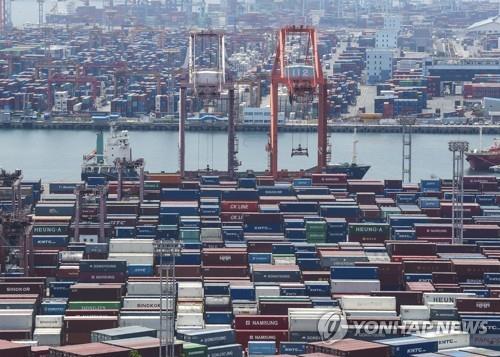- California Assembly OKs highest minimum wage in nation
- S. Korea unveils first graphic cigarette warnings
- US joins with South Korea, Japan in bid to deter North Korea
- LPGA golfer Chun In-gee finally back in action
- S. Korea won’t be top seed in final World Cup qualification round
- US men’s soccer misses 2nd straight Olympics
- US back on track in qualifying with 4-0 win over Guatemala
- High-intensity workout injuries spawn cottage industry
- CDC expands range of Zika mosquitoes into parts of Northeast
- Who knew? ‘The Walking Dead’ is helping families connect
Exports up 21.3 pct in May; trade deficit extended on high energy prices
South Korea’s exports rose 21.3 percent in May from a year earlier on solid demand for chips and petroleum products, but the country suffered a trade deficit due to high global energy prices, data showed Wednesday.
Outbound shipments stood at US$61.52 billion last month, up from $50.73 billion a year earlier, according to the data compiled by the Ministry of Trade, Industry and Energy.
It is the highest tally for any May since the ministry began compiling related data in 1956. The previous record was set a year earlier.
It is also the second-largest ever monthly figure following the record number of $63.79 billion set in March 2022, the data showed.
May marked the 19th consecutive month that the country’s exports have logged an on-year expansion. Exports also posted double-digit growth for the 15th month in a row last month.
But high global energy prices amid the crisis surrounding Ukraine also pushed up the country’s imports last month, leading the country to suffer a trade deficit for the second consecutive month.
Imports jumped 32.0 percent on-year to $63.22 billion on soaring global energy prices, leading the country to post a trade deficit of $1.71 billion, the data showed.
Initially, the government said the country had a trade deficit in March, citing its preliminary data, but its revised data showed a trade surplus of $210 million that month.
Dubai crude, South Korea’s benchmark, rose to $108.16 per barrel in May on average from $66.34 a year earlier.
South Korea depends on imports for most of its energy needs, and the country’s energy imports spiked 84.4 percent on-year to $14.75 billion in May, the ministry said.

This file photo, taken on May 23, 2022, shows stacks of containers at a port in South Korea’s southeastern city of Busan. (Yonhap)
Overseas demand for the country’s key export items hit an all-time monthly high in May amid a global economic recovery to lead the overall exports growth.
Sales of semiconductors grew 15 percent to $11.55 billion and those of petroleum products surged 107.2 percent to $6.4 billion won in May.
Steel products also saw their sales overseas increase 26.9 percent on-year to $3.66 billion last month, and bio sectors enjoyed 24.6 percent on-year growth to $1.5 billion in May.
Auto exports also climbed 18.9 percent to $4.15 billion and those of car parts rose 7.6 percent to $1.96 billion.
By nation, exports to the United States, the European Union, the Association of Southeast Asian Nations (ASEAN) and India reached a record high for any May ever.
Sales in the U.S. advanced 29.2 percent to $9.62 billion and those in the EU 23.5 percent to $6.05 billion. The exports to ASEAN increased 23 percent to $10.64 billion and those to India surged 70.3 percent to $1.69 billion.
Shipment to China also inched up 1.2 percent on-year to stand at $13.41 billion, a turnaround from an on-year fall the previous month, despite the lockdown of Shanghai and other major cities over the fast spread of COVID-19.
But exports bound for the Commonwealth of Independent States (CIS) sank 37.9 percent to $680 million in May due to the Russia-Ukraine war, the ministry said.
Of them, sales in Russia tumbled 59.4 percent and those in Ukraine sank 80.7 percent.
“South Korea recorded a double-digit growth in exports despite such unfavorable circumstances as soaring inflation, high inflation rates and the slower growth of major nations.” Industry Minister Lee Chang-yang said.
“In the face of global uncertainties and concerns over a trade deficit, the government will focus on lifting regulations and pushing for new trade measures so as to ensure stable supply chains and to help our companies boost investment and innovation,” he added.











